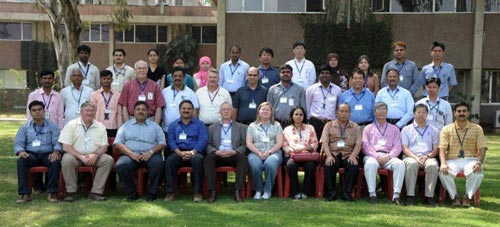The Affordable, Accessible, Asian (AAA) Drought Tolerant Maize Project, a Syngenta/ CIMMYT partnership, held its annual meeting at the ICRISAT-Patancheru campus in Hyderabad, India, on 15 March 2012. Funded by the Syngenta Foundation for Sustainable Agriculture (SFSA), the five-year project aims to help smallholder farmers in Asia grow more food and better provide for their families through the development of improved maize varieties. It supports smallholder farmers who lack access to irrigation by developing affordable and accessible drought tolerant maize in partnership with other National Agricultural Research Systems (NARS) in Asia.

The meeting was attended by 30 representatives of Syngenta, national agricultural research programs, and CIMMYT. BM Prasanna, director of CIMMYT’s global maize program, began the meeting, M Robinson of SFSA gave an overview on public/ private partnerships in the seed development and distribution industry, and BS Vivek, CIMMYT senior maize breeder, outlined the progress made in the first year of this project. P Zaidi, CIMMYT senior maize physiologist, reported on progress in root phenotyping, and Girish Kumar, CIMMYT maize molecular breeder, summarized advances in genotyping. Other presentations highlighted progress made by Syngenta (RP Singh, AAA lead for Syngenta and M Longrono, Asia corn breeding lead), national program of Vietnam (Van Vang, Vice Director, NMRI), and national programs of Indonesia (M Azrai, maize breeder, ICeRI). The meeting concluded with a visit to the drought trials at ICRISAT.
During this first year, the AAA project and the International Maize Improvement Consortium for Asia (IMIC-Asia) jointly conducted the course “Phenotyping for Drought Tolerance in Maize” held at ICRISAT on 19 December 2011. The course was attended by 70 breeders and technicians from 26 seed companies; PH Zaidi and BS Vivek served as resource persons. Training on all aspects of how to achieve adequate stress in drought trials was included, as well as data recording, analysis, and interpretation.
 Capacity development
Capacity development 
